|
FOR the more part, the
original settlers in this County are not, as in other Counties, farmers.
They were rather traders and fishermen; who filled up their spare time,
as many do yet, with a little farming. Whatever tended to promote the
extension of their
MARITIME INTERESTS
was then, as it is now, looked on as of paramount importance. One little
schooner of twenty-five tons, named the “Pompey,” represented the
Yarmouth shipping list of 1761. The second year probably served to
treble it. We know that Captain George Ring and Ephraim Cook were then
concerned together in fishing vessels: and about the same time Captain
Seth Barnes had one schooner, the “Elizabeth;” and shortly afterwards
two,—the “Elizabeth” and the “Polly.” In the year 1764, Walter Sollows
built the first vessel that was launched in the County—on Fish Point in
Cape Forchue Harbour. Without doubt those vessels were exclusively
engaged in fishing, and in H carrying the surplus produce to the New
England markets. There were fishing stands at Cook’s beach in 1760 and
1761; at Fish Poin^ in 1762; at Puhnico in the same year; and more than
once we have instances of grants of land, suitahle for such purposes,
having been made. About thirty years after the settlement of Yarmouth,
there were about twenty-five vessels belonging to the Township, with an
aggregate of 550, or an average of twenty-two tons. The first vessel
which was lost, belonging to this Township, was the “Sally,” in the year
1777, owned and commanded by Captain John Barnard. All hands were lost.
The next was the “James,” owned by James Allen, and commanded by Captain
Joseph Allen. She was lost off Sambro Light. Four years after, two other
vessels were wrecked, strange to say all hands lost; making an ominous
beginning in the first twenty years of four losses, in three of which
every soul perished. As the number owned has increased, accidents have
become necessarily, from various causes, painfully frequent.
Besides the shipping, or rather the fishing and trading detailed, there
were the
EARLY LOCAL MERCHANTS,
whose business
transactions are of older date, and larger amounts, than might hayo been
supposed. It may sound a little paradoxical to say that a Ledger exists
with items entered in it, which were sold here before any settlers
arrived. The explanation lies in the fact, already illustrated in
Ephraim Cooke, that the men who frequented these shores for fishing
purposes did their season’s work, and then returned home. Some of the
items, both as to cost and kind, to say nothing of the orthography, are
not a little puzzling and amusing. I have here appended a few on
different industries :—
The labour market stood thus, for example—
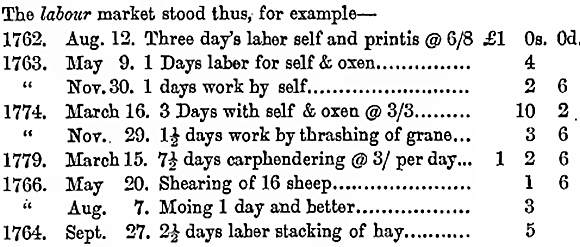
Carpenters, mowers, and stackers of hay, would consider this rather
serious wages. Those of sailors and fishermen are still more suggestive.
Thus, for instance:—

It does not appear that
the prices of provisions, groceries, if we except tea and the like,
varied much from what they now are; but, when compared with the rate of
wages, they were very high. For instance:—

The Fur business was,
in the early days of the settlement, of considerable importance and
extent. The following list, made up from a variety of sources, shows at
a glance, both the kinds of animals abounding and the value of their
skins, about the year 1764:—
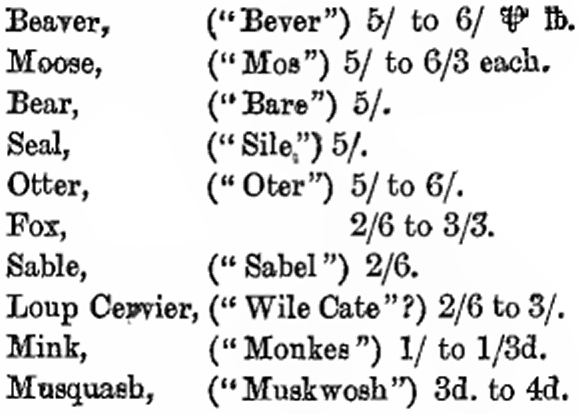
Entries of such
articles as the following, for which we should certainly ask in vain in
our most complete Dry Goods establishments, are not at all uncommon :—

And, if it fell out
that, in the transaction of their business, those old gentlemen of a
hundred years agone had some variance, they had a happy way of settling
their differences, as the two following instances will show:—:
1764. Aug. 24. For peas sake for skins that was laust £1 3s. 6d.
And again :—
1764. Not. 15. Credeat for peas sake and past results
in full for ever ..... ,£0 7s. 4d.
This, to say the least, looked like an honest endeayour to obey the
Apostolic maxim to “live peaceably with all men.” The ruling passion for
gain, however, was in at least one case, irresistible; for, on the very
next folio, a fresh account was hopefully opened. Scarcely less
entertaining are the two following items, illustrative of business terms
used in settlements of accounts:—
“Jan. 11, 1775 this day reeond and setteld all book aooompts from the
begining of the world to this day with C. D. witness our hands—A. B. and
C. D.”
And again :—
“Feb. 12, 1778. This day reeond and setteld all accompts from the
beginning of the world to this day with C. D.—and there is due to him
one pound one shilling. Witness my hand—A. B.”
There is very little, if anything, to show what the imports or exports
of the County during the first thirty years amounted to. The first
Collector in Yarmouth was Mr. John Crawley; but as early as 1766,
“Lieutenant Ranald McKinnon was appointed Collector for the Impost,
Excise, and License duties for the Townships of Barrington and Yarmouth
in the room of John Crawley resigned". I have not been able to ascertain
whether he or Mr. Crawley ever made any return. In 1787, when Yarmouth
was made a Port of Entry, Joseph Norman Bond, then residing in Shelhurne,
was made Deputy Collector; and about this time there are a few slight
traces of duties. This gentleman, the father of our much respected
citizen Dr. Joseph B. Bond, was a native of Neston, Cheshire, England;
and was educated in London for the Medical profession. He was Assistant
Surgeon in the British Army, and was among those who were under the
command of Cornwallis, when that general surrendered his army of 7000 at
York Town to Washington. He attended the prisoners taken under Burgoyne
and Cornwallis, from Lancaster to New York. He held many public offices,
besides discharging bis professional duties. At first be was Deputy, and
afterwards in 1806, Custom House officer. He held a commission as
Justice of the Peace; and as Colonel of Militia. In 1808, be was made
Surveyor of Vessels, his certificate entitling the holders of them to a
certificate in Halifax. He was frequently intrusted by the Government
with the discharge of public duties, and the execution of important
public works. He was the pioneer of the Loyalists, I believe, as well as
the first member of the Church of England, who settled in Yarmouth. He
is allowed to have been a man of very considerable character, with great
firmness and determination.
During the period we are now tracing, a visit was made to Yarmouth by an
itinerant preacher, Henry Alline, which deserves careful notice, on
account of the extensive subsequent results which followed, from a
religious denominational point of view, amounting almost to a
RELIGIOUS REVOLUTION.
It is only repeating words to say that, as with scarcely an exception,
the early inhabitants of Chebogue, Cape Forchue and Argyle, .were from
New England, and that they were adherents of that form of faith which
prevailed throughout the New England States. But it is also plain, from
various considerations, that the lines between the Congregational and
Presbyterian systems were not very sharply defined. The constant use of
the phrase “Congregational or Presbyterian" in which, two words of very
different signification are used as if they had the same meaning, is
evidence to the point. It was probably as convenient for the necessities
of the settlers then, as it might be for the good feeling and harmony of
the community now, not to enquire too narrowly, or define too closely.
The first who ministered to the Church at Chebogue, was Mr. John Frost.
He was ordained by the laymen of his Church,—without the help or
intervention, as in Presbyterian ordination, of any Session or
Presbytery. Mr. Frost did not serve the congregation more than seven
months after he was ordained. The next minister was the Eev. Jonathan
Scott. He came to Yarmouth in 1767. He preached his first sermon in
1768; but he was not ordained until 1772. The first gathering of the
church at Chebogue had taken place on December 18th, 1767.* Mr. Scott
continued to minister, we have every reason to believe, acceptably to
his people, who had hitherto supported him unanimously, to the best of
their ability. They assisted him in building his house, which is now the
oldest house as well as the oldest parsonage in the County, and
otherwise maintained him. And so he continued for fifteen years. At the
end of that time,
HENRY ALLINE,
who, as before said, was an itinerant preacher of the body then lately
organized, and known as “New Lights,” visited Yarmouth. He was a native
of Rhode Island: and must evidently have been a man able, at least, to
rouse the people, and alter existing institutions. He published his
views in a volume printed in Halifax in 1781, in which he set forth
doctrines which no sane person could now he found to believe or defend.
He disregarded upon principle, all order or discipline in the Church,
defending his right to a roving commission; despised the sacraments;
organized Churches before he had any kind of commission or authority;
and, in the language of a favourable biographer, “he was more fitted for
destruction than for construction: and that he did not go to Heaven too
soon.” His journal informs us that he made three visits to Yarmouth; the
first, extending from the 18th to the 26th of October, 1781; the second
from the 7th to the 19th of February, 1782 ; and the third and last,
from the 5th to the 17th of October of the same year. Short visits; but
pregnant with results. The immediate effects of those visits, arising
out of his intruding himself into Mr. Scott’s Cure, and the consequent
altercations between them, were, that long friendships were rudely
snapped; the bitterest animosities engendered; the old Religious Society
dismembered, whilst a new one, holding Mr. Alline’s views, was built on
its ruins; and the old and settled Pastor of 20 years practically
discarded. He left Chebogue finally on November 21st, 1793, for the
Pastorate of Barkerstown (now Minot) in the State of Maine; where he
laboured till he died, in 1819. The house which Mr. Scott built as a
Parsonage still stands in very nearly its original condition, on the
farm of the late John Cook, son of Ephraim, at Little River. It was an
unusually good house in its time, built of hewn logs, once nobly
clapboarded; with a huge fireplace, in the side of which is a brick
oven. Having been built in 1766-7, it is, as before said, at once the
oldest house, and the oldest Parsonage in the County. During the
disturbance, in the year 1784, about three years after Mr. Alline’s
first visit, Mr. Scott wrote a defence of his position. It might have
been all very true, and unanswerable; but it did not bring back old
friends. The work of estrangement had been too well done. I here append,
as literary curiosities, the titles of the books written respectively by
Mr. ALline and Mr. Scott. They are volumes of about 340 pages; and have
become very rare:—
Title of Allen’s book:
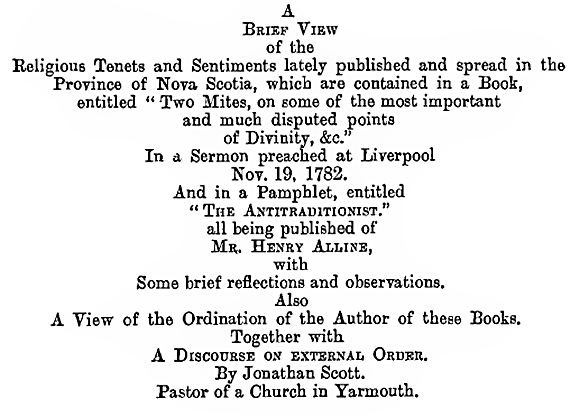
The views, if such they
can be called, which were advanced hy Mr. Alline, gradually gained a
footing. They were at first wild and repelling, yet singularly
fascinating to all who Miled the rise of an unrestrained and ungoverned
kind of system which gave the widest liberty of speech and the greatest
diversity of practice, as distinct from the Congregationalism which had
hitherto been prevalent. The more repugnant elements of his creed
however, were, in the main, rejected; and those who became attached to a
new system through his agency, gradually toned down into the now
moderate and very widely spread Christian body of Calvinist Baptists,
which is the largest religious denomination in the County. Under the
fostering care and unwearied zeal of
THE REV. HARRIS HARDING,
who was not afraid to
describe himself as a New Light, congregations were soon gathered
together in different parts of the County. Mr. Harding paid his first
visit to Yarmouth in the year 1790; and here, with slight intervals, he
continued to labour and to live, until his death in 1854. He was bom in
Horton in 1761, the same year that Yarmouth was settled. His parents
were Episcopalians ; but in early life when thinking about religion he
vibrated, for some time, between the Methodists and the New Lights; and
finally he connected himself with the latter.
His lot was cast in times when the state of the Society with which he
was connected precluded theological consistency; and his biographer,—the
late Bev. John Davis — has detailed as matters of interest, the several
changes and modifications which Mr. Harding’s religious opinions and
practices underwent, as years rolled on. Circumstances and facts are
tlius preserved, the record of which would have been out of place as
regards any private person; but which are noteworthy in Mr. Harding’s
case, inasmuch as they are intimately hound up with the public history
of half a century of religious opinion in this County. In early life he
held in very moderate estimation all kinds of human learning, which he
viewed as an interference with the Spirit. But there are traces of
modification of this opinion in his later years. Similarly, on the
doctrine of baptism, his views from time to time -underwent very
considerable changes. Whilst he was in Horton, before coming to
Yarmouth, he baptized, by sprinkling, men, women, and children. Baptism
by immersion he severely described as a device of Satan. But after he
had ministered in Yarmouth about fifteen years, he was himself baptized,
by immersion, at Milton; i though, in later life, he appears to have
held the opinion that baptism was unnecessary, if any one had the
spirit. For more than thirty years, he opposed Close Communion.§ But
during that time the prevailing popular view changed; and, at length, in
1828, he and his church went into union with the Nova Scotia Baptist
Association. Notwithstanding, even to the close of his life, “he
advocated the Open Communion theory, both in public and private.” In his
younger days he was slight; hut in later years he became very corpulent.
He died in 1854 at the advanced age of 93, leaving behind him a large
family and very numerous and attached adherents. He exercised great
influence in his life time, which, to a large extent, still continues.
He was very zealous and unwearied in his labours, not sparing himself
even in extreme old age. A monument of a partially public character was
erected in his memory; and although of a somewhat wordy nature, I have
inserted the inscription in these pages:—
“In Memory op the Rev. HARRIS HARDING-: born Oct. 10, 1761; died, March
7, 1854.
“For nearly Seventy Years, Sixty of which were spent in this
Neighbourhood, he proclaimed the Gospel which he loved, with unwearied
diligence, and extraordinary success.
“And they that be wise shall shine as the brightness up the firmament;
AND THEY THAT TURN MANY TO RIGHTEOUSNESS AS THE STARS FOR EVER AND
EVER.’ DAN. 12. 3.
“Mr. Harding first visited Yarmouth in 1790. In 1797 he came hither to
labour statedly in the Gospel.
“In 1827 he and his Church, the members of which resided in all parts of
this County, united with the Nova Scotia Baptist Association. At his
death he was the senior Pastor of the first and Second Yarmouth Baptist
Churches.
“This Monument is erected by the inhabitants of Yarmouth and its
vicinity, and by the members of the various Churches which participated
in the labours of the departed, as a testimony to the worth of the Man,
and graces of the Christian, and the usefulness of the Preacher.”
The following list comprises the names of all the Pastors of the First
Baptist Church down to, and including the present incumbent:—
"Rev. Harris Harding.
“William Burton.
“John Davis, A. M.
“Henry Angell.
“A. H. Munro.
“Geo. E. Day, M. D.
The number, as well as the comparative lateness of successive Baptist
Churches, preclude at once the propriety and the necessity for extending
this list. But the reader is here presented with a view of the Temple
Chubch, and to which reference is made further on.
Whilst speaking on this topic, I think it not improper to append the
numbers attached to the several Religious Denominations at the last
census (1871); modifications of which have taken place; and allowance
for which must be made by the reader :—
Baptists 6225
Roman Catholics 5801
Free Baptists 3671
Wesleyan 1012
Church of England 908
Presbyterians 592
Congregationalists 407
Adventists 41
Methodists 20
Protestants 14
Quakers 12
Episcopal Methodists 9
Mormons 2
Universalists 2
Lutheran 1
Unitarian 1
Without Creed 17
Not given 315
Total 18,550
And all these are in possession of 104 buildings, of which 48 are places
of worship.
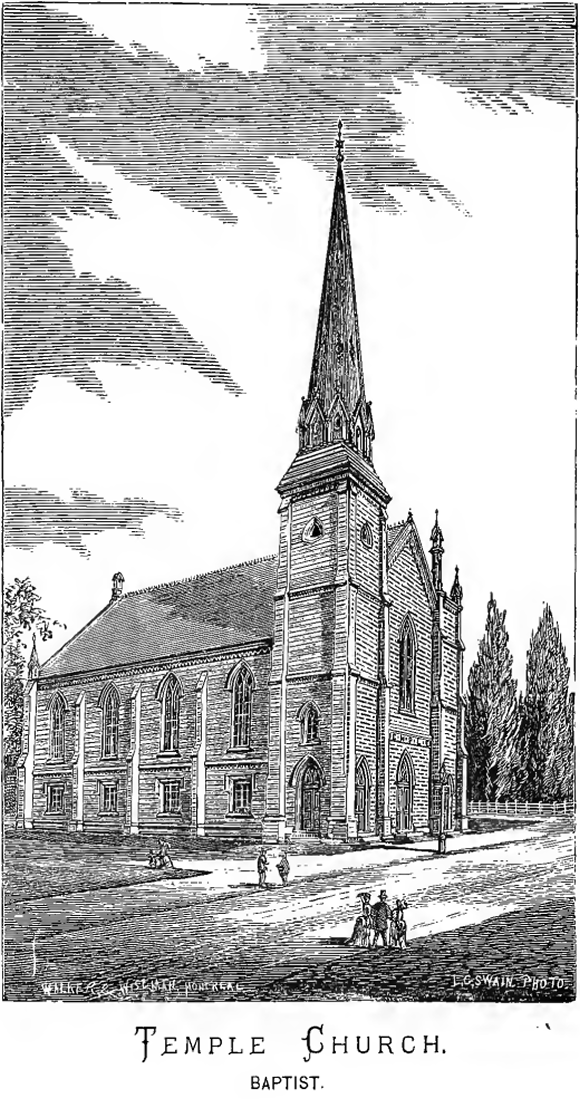
I am not ignorant that
Appendices are very seldom read, and yet, they often contain the very
pith and marrow of a matter. It is with the hope and belief that the
following list of early settlers of Cape Forchue and Chebogue, will be
as carefully read as the information it contains is interesting, that it
is here inserted. It is the result of many a long journey; and, if
possible, of still longer conversations. It contains a kind of
information as curious as it was difficult to get at; and, as a
contribution to the early history of Yarmouth, its worth is scarcely to
he exceeded. Some idea of the difficulty of obtaining the information
here collected will be realized by any one who is curious enough to try
to fill up a blank space, or make a trustworthy correction.
The list supplies the date of arrival, the name, the place where from,
and the first residence of all the early settlers of Cape Forchue and
Chebogue, who have left, their names or their memory behind them, up
till the end of the last century; or, for the first forty years. By
memory is meant, for example, Bunker's Island, a trace—the only one—of
Hezekiah Bunker. Much personal enquiry, and the examination of every
document which could throw any light upon the subject, have been
resorted to in compiling this list. Still, perfection is not claimed for
it. In some cases, these early settlers are known to have made removals;
but the first spot pitched upon is the one which is here intended:—
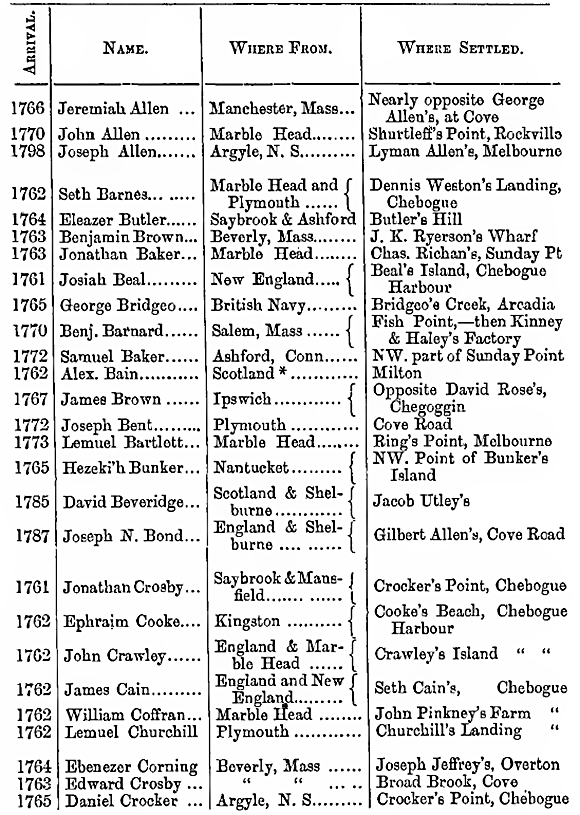
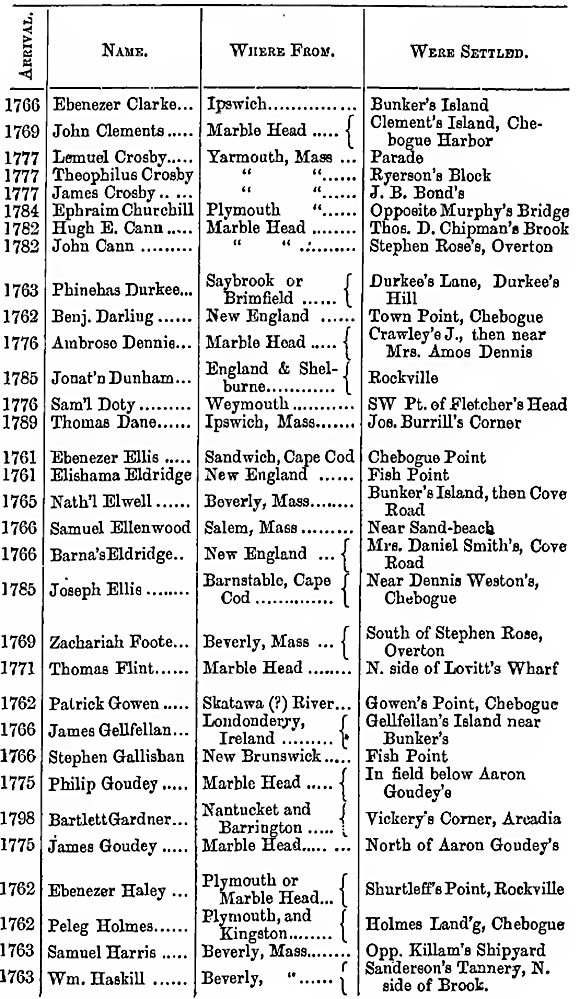
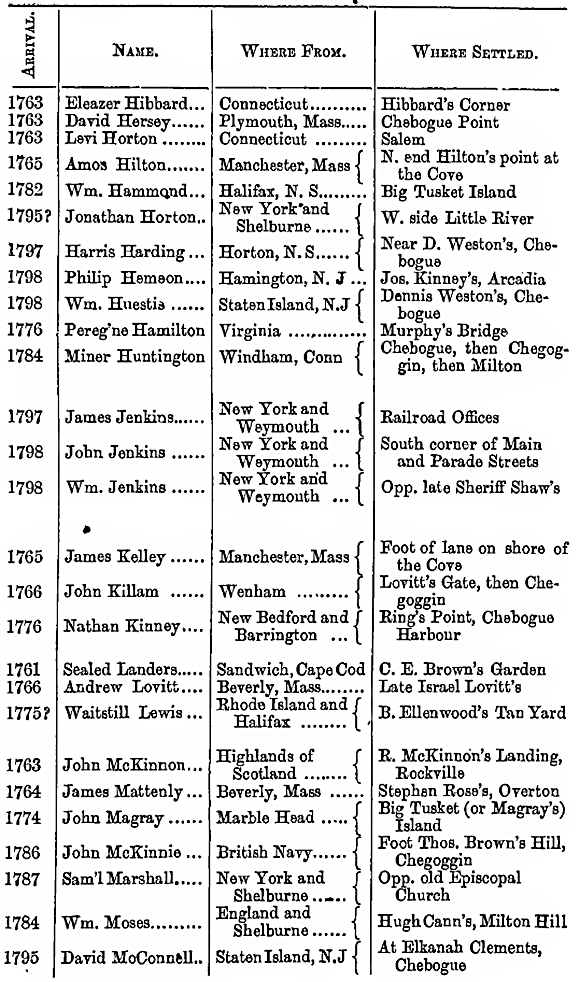
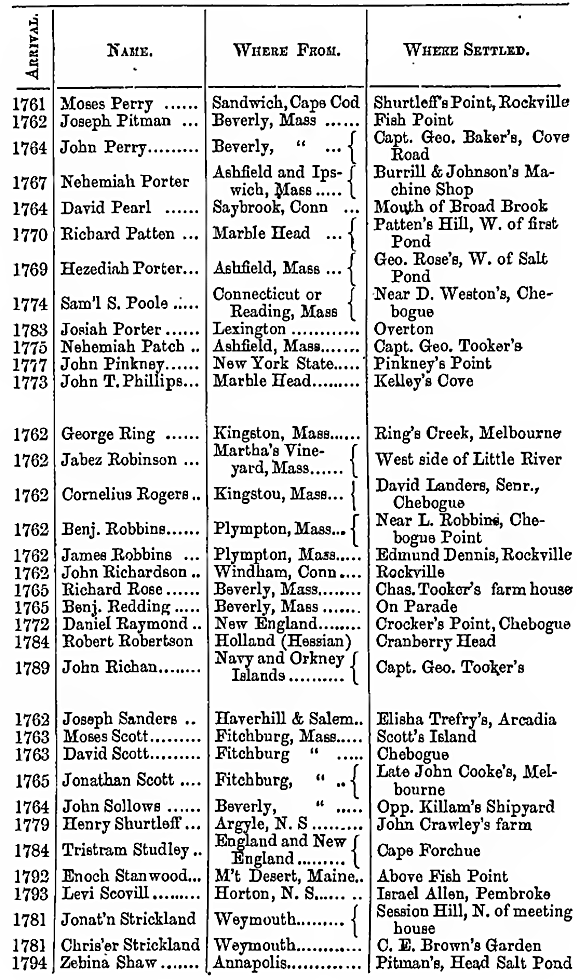
There is a romantic
interest attached to the early history of Ales. Bain, or, more properly,
MoBain. His family emigrated from Scotland about the year 1761-2; and
the vessel in which they came, was lost somewhere near St. John. His
father, mother, and sister were lost; while he, a child of eight,
escaped, by clambering along a fallen mast. He was brought to Yarmouth
in 1762, by John McKinnon, on Chebogue Point, who also brought him up. |
